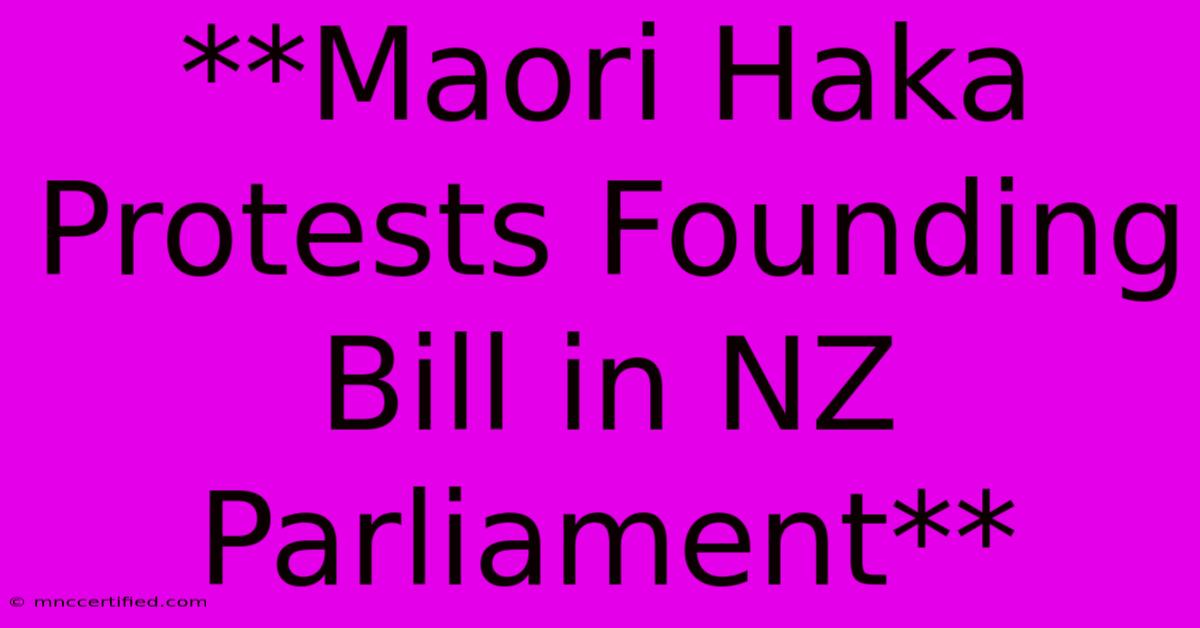**Maori Haka Protests Founding Bill In NZ Parliament**

Table of Contents
Maori Haka Protests Founding Bill in NZ Parliament: A Display of Cultural Strength and Political Discontent
On [Date], the halls of the New Zealand Parliament echoed with the powerful chants and stomping feet of a traditional Maori haka. This wasn't a ceremonial welcome, however, but a passionate protest against the founding bill, a controversial piece of legislation sparking heated debate across the nation.
The haka, a traditional war dance of the Maori people, served as a potent symbol of their cultural pride and opposition to the bill. The protesters, a mix of Maori activists, community leaders, and concerned citizens, utilized the haka to express their deep-rooted grievances and demand for change.
What is the Founding Bill and Why the Outrage?
The founding bill, formally titled [Insert Bill Name], aims to [Insert Bill Purpose]. While the bill's proponents argue it will [Insert Positives], critics vehemently denounce it for [Insert Negatives].
The Maori community, in particular, sees the bill as a threat to their cultural sovereignty, land rights, and self-determination. They fear it will [Insert Specific Concerns].
Maori Haka: A Voice of Resistance
The use of the haka in this protest is no mere coincidence. For generations, the haka has been more than just a dance; it's a potent symbol of Maori identity, strength, and resistance.
The haka's presence at the Parliament building underlined the gravity of the situation and the determination of the Maori people to be heard. It served as a powerful visual reminder of the historical struggles and ongoing fight for justice and equality.
Implications and Future Prospects
The Maori haka protest at the Parliament building signifies a critical moment in New Zealand's political landscape. It highlights the growing frustration within the Maori community and their demand for greater recognition and representation.
The protest's impact on the future of the founding bill remains to be seen. However, it has undoubtedly brought the issue to the forefront of national attention and initiated a crucial conversation about Maori rights, historical injustices, and the future of New Zealand's social fabric.
Moving forward, the New Zealand government must address the concerns raised by the Maori community and engage in meaningful dialogue to find solutions that are equitable and inclusive. The protest serves as a stark reminder that true progress can only be achieved through understanding, respect, and reconciliation.
Keywords: Maori, Haka, Protest, Founding Bill, New Zealand Parliament, Cultural Sovereignty, Land Rights, Self-Determination, Historical Injustices, Reconciliation, Equality, Representation, Justice, National Dialogue, Social Fabric.

Thank you for visiting our website wich cover about **Maori Haka Protests Founding Bill In NZ Parliament**. We hope the information provided has been useful to you. Feel free to contact us if you have any questions or need further assistance. See you next time and dont miss to bookmark.
Featured Posts
-
Heaven Hill Bottled In Bond 7 Year
Nov 15, 2024
-
Usa Vs Jamaica 2024 Nations League Quarterfinals
Nov 15, 2024
-
Cynthia Erivos Wicked Whistle Cover
Nov 15, 2024
-
When Does Tyson Vs Paul Fight Start In Uk
Nov 15, 2024
-
Sentinel Insurance Company Limited
Nov 15, 2024